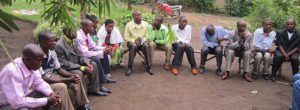There has been much talk of the prevalence of rape culture in the United States during the past year – on college campuses, in the military and on the streets. For a vision of how to stop the violence, we can turn to an innovative program supported by Jewish World Watch that is taking place in Eastern Congo.
Known as the “rape capital of the world,” the eastern region of the Democratic Republic of the Congo has long been riven by rampant sexual violence against women, including by members of the military. One small Congolese-based organization is trying to change the region’s culture, by teaching Congolese men to meet with their peers to share a simple curriculum of empowerment, respect and self-awareness. The hugely successful program, begun five years ago with 50 men, has reached some 27,000 men already – transforming lives both in homes and in the public space.
[su_row][su_column size=”1/2″]
In the video above, Africa New Day founders Esther and Camille Ntoto relate how they came up with the idea for the Sons of Congo program.
[/su_column]
[su_column size=”1/2″]
Dubbed “Sons of Congo,” the curriculum was created by Esther and Camille Ntoto, a Congolese couple educated at Vanguard University in Orange County, California. After completing their studies in California, the couple moved to Goma, North Kivu, in Eastern Congo, near the border of Rwanda. It was here they founded the NGO Africa New Day.
The violence of the 1994 genocide in Rwanda had spilled over into Congo (then Zaire), and when the Ntotos arrived to work on a missionary post, Esther found herself working closely with women who were victims of violent rape and were awaiting rehabilitative help at a hospital. She created a support group where the women could share their horrific stories in an effort to heal. Esther shared those stories each evening with her husband, Camille, until one day, he told her he couldn’t hear it any more. He wanted to do something to stop the root cause of the violence.[/su_column][/su_row]
Rather than focus only on the women, Esther and Camille decided they needed to also change the men, so they set out to find a way to do so. “We thought, we have to look for men where they are. And it’s not just one category of men — it’s all men. We have to go to universities, churches, companies and organizations, prisons, military camps, police, where they are – in the bush – wherever they are, that’s where we are going.”
[su_quote]Sons of Congo offers men a chance to talk to other men about their culture, and how traditional ways of treating woman that seemed “normal” — including abduction and rape — are wrong. Sometimes these lessons came as a surprise. [/su_quote]
There was no model for such a radical culture-changing program, but they knew they could not call it “How Not to Rape.” Instead, they chose a name of empowerment. Initially they told the men they were creating a group called “The Rising of the Sons of Congo,” and they got an immediate positive response. Once enrolled, some in the group confessed that they’d thought the name indicated a new political party. But even so, the men stayed.
“As we were working with the men,” Camille remembers, “it was surprising to us the kind of response we got. We never thought it would catch on fire like it did.” The men loved the chance to participate.
“Remember, at this point in time, everyone was trying to help women and children. There was microfinance, there was counseling, there was healthcare and things like that for the women,” Camille said. “And in a society where the unemployment rate among men is more than 80 percent, many men stay home and they look at the women in their communities being empowered, being the center of attention about these NGOs, and they’re thinking, ‘What about us?’”

Sons of Congo participants have to share the lessons with another set of men before being awarded a certificate of completion.
Sons of Congo’s curriculum offers these men a chance to talk to other men about their culture, and how traditional ways of treating woman that seemed “normal,” including abduction and rape, are wrong. Sometimes these lessons came as a surprise.
“One of the lessons was, man and women are made in the image of God,” Camille said. “They knew that man was made in the image of God, but the surprise was – women too. So part of the curriculum was digging into that lesson and making them understand. This led them to another way of thinking and behaving.”
Graduation from the Sons of Congo takes more than just completing the curriculum; the men have to also share the same lessons with another set of men before they are awarded a certificate of completion. With this motivation, the program has, in its own way, gone viral, its popularity growing by the day.
“Some of the most rewarding testimonies after someone completes the curriculum come from the women,” Esther said. “When a woman calls me and says, she knows that her husband is going somewhere, but the only thing she knows is that women are not allowed. Then she notices that her husband or uncle or brother is different, is changing. We get calls where women tell us: “I don’t know what’s happening to my husband. I don’t know what you’re doing to him. But I tell you, keep doing it. Because we’re seeing a transformation.”
[do_widget id=black-studio-tinymce-23]


